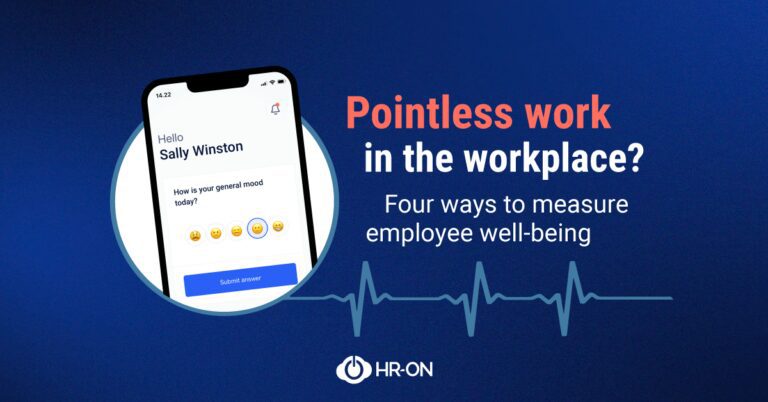Pointless Work in the Workplace: Four Ways to Measure Employee Well-being
Is it possible to go to work and spend time on tasks inherently lacking value? The concept of ‘pointless work’ and its impact on the workplace has been a subject of ongoing discussion. Keep reading to explore whether pointless work affects job satisfaction and well-being.
Many of us have likely encountered words like ‘efficiency,’ ‘productivity,’ and ‘streamlining’ in the workplace. There is a prevailing belief that all our tasks should hold significance. When our work is thriving—meeting deadlines and producing outputs that instill pride—we sense a deeper meaning in our contributions.
But what happens when we are assigned tasks that seem unrelated to our job description or lack apparent benefits for the company? Ultimately, the feeling of pointless and ineffective work influences your well-being. The University of Zurich conducted a sociological study revealing that many employees perceive their work as socially useless. Furthermore, the survey found that office jobs were twice as likely to feel socially meaningless.
Is it possible that there is meaningless and unproductive work in the workplace? Even when specific tasks do not immediately reveal their direct value, it does not imply they lack worth.
You might also like: Find out the level of diversity in your company
The Story Behind: The Theory of Bullshit Jobs
The theory of “Bullshit Jobs,” introduced by David Graeber, highlights a category of employment perceived as devoid of societal value and personal fulfillment. Often found in bureaucratic or corporate settings, these jobs involve tasks seemingly disconnected from genuine purpose or productivity. Graeber argues that such roles, characterized by excessive meetings, pointless paperwork, or activities generating no tangible benefit, create a sense of pointlessness for individuals performing them.
Before concluding that there is pointless work in the workplace, consider asking these four questions to your employees when they undertake a task, and contemplate how you can utilize surveys to engage your workforce:
- How does this task contribute to the company’s overall goals?
- Is there a more efficient way to accomplish the task?
- How does this task impact your general workday?
- Does this task fit to your role and responsibilities?
It is also crucial to remember that the impact of one’s work does not always have to be materialized and quantifiable. In other words, one’s work can be valuable even if its effects are not immediately visible.
Ease the HR headache with our all-in-one platform, HR-ON Staff. Gain control from onboarding to offboarding and everything in between.
You might also like: Employee Well-being in Changing Times
Well-being and Pointless Work
If employees experience pointless work, it is essential to investigate its extent as it affects job satisfaction. The more hours employees spend on pointless work, the lower their job satisfaction.
Find a solution that best fits your company. Besides engaging in conversations with employees, assessing their feelings after a workday is a good idea. For instance, you can use pulse surveys that measure workplace job satisfaction and develop strategies in HR to enhance employees’, managers’, and student workers’ experiences.
Consider using the employee app StaffBuddy. Create a pulse survey in HR-ON Staff, and send it through the app, allowing your employees to provide their responses. Doing so can provide an overview of your employees’ well-being and satisfaction levels.
Do you wish to explore our products, HR-ON Recruit, HR-ON Staff, or StaffBuddy? Book a demo today and have a conversation with our sales team to discuss your needs and find the right solution for you.
FAQ: Pointless Work
What is pointless work?
Pointless work refers to roles or occupations often seen as unnecessary, unfulfilling, or lacking meaningful contributions to society. These positions might involve excessive bureaucracy, pointless tasks, or roles that do not significantly contribute to the overall purpose of an organization.
How does pointless work impact employees and organizations?
Employees doing pointless work might experience dissatisfaction, frustration, or a lack of purpose and well-being. For organizations, having positions that do not add value can result in inefficiency, decreased productivity, and wasted resources, affecting overall performance and morale.
What can be done to address or reduce pointless work in the workplace?
Organizations can reevaluate job roles, streamline processes, and prioritize tasks that contribute meaningfully to their objectives. Encouraging autonomy, providing opportunities for skill development, and fostering a culture that values meaningful contributions can help reduce the prevalence of “bullshit jobs” and create a more fulfilling work environment.


